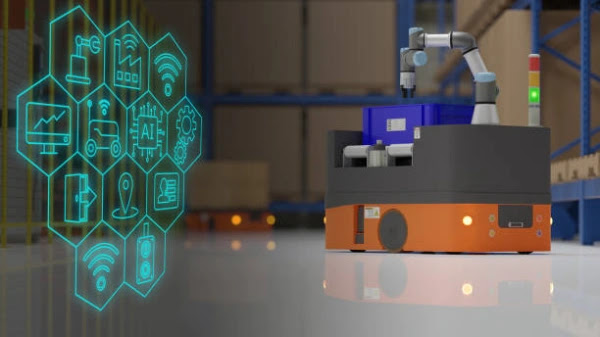Featured
- Get link
- X
- Other Apps
Smart Technology
Revolutionizing Healthcare with Smart Technology
In recent years, the healthcare industry has been undergoing
a profound transformation fueled by advancements in innovative technology. These
innovations, from wearables and telemedicine to artificial intelligence (AI)
and data analytics, are reforming how healthcare is delivered, monitored, and
managed. This paradigm shift holds the promise of improving patient outcomes,
enhancing the efficiency of healthcare systems, and ultimately shaping a
healthier world.
One of the most visible and impactful manifestations of intelligent
technology in healthcare is the proliferation of wearable devices. These devices,
from fitness trackers to smartwatches, are prepared with sensors that can
monitor vital signs, track physical activity, and even analyze sleep patterns.
This wealth of data empowers persons to take charge of their health by making conversant
decisions about their lifestyle, exercise routines, and nutrition. Moreover,
wearable technology has a significant role in preventive healthcare, as it can
alert users and their healthcare providers to potential health issues before
they escalate into more severe conditions. For instance, irregular heartbeats
detected by a smartwatch can prompt individuals to seek medical attention,
potentially preventing heart-related emergencies.
Telemedicine, another groundbreaking application of intelligent
technology, has recently become especially relevant. The global COVID-19
pandemic forced healthcare systems to adopt remote medical services on a much
larger scale. Video consultations, remote monitoring of patients, and
electronic prescription systems have demonstrated their value in ensuring the steadiness
of care while minimizing the risk of disease transmission. Even as the pandemic
recedes, telemedicine remains a crucial tool in reaching patients in remote or
underserved areas, reducing travel times and costs, and providing access to
specialist expertise that might not be locally available.
The backbone of these technological marvels is artificial
intelligence. AI has permeated nearly every aspect of healthcare, from
diagnosis to treatment planning and drug discovery. Machine learning processes
can analyze vast amounts of medical data, ranging from medical images to
genomic information, and assist clinicians in making accurate diagnoses. This
not only improves the efficiency of healthcare delivery but also reduces the
potential for human errors. For instance, AI-powered diagnostic tools have
shown remarkable accuracy in detecting certain medical conditions, such as skin
cancer, by analyzing images and identifying subtle patterns that might escape
the human eye.
Beyond diagnostics, AI is contributing to personalized
medicine. By analyzing an individual's genetic makeup and medical history, AI
algorithms can predict a patient's response to specific treatments, enabling
physicians to tailor therapies for better outcomes. This approach is promising
in cancer treatment, where medicines can be optimized based on the tumor's
genetic profile, minimizing unnecessary side effects and maximizing the chances
of success.
Data analytics is another cornerstone of the healthcare
revolution. The healthcare sector generates enormous volumes of data, including
patient records, treatment outcomes, and medical research findings. Innovative
technology harnesses the power of big data analytics to derive insights that
inform decision-making at various levels. Healthcare providers can identify
trends, predict disease outbreaks, and optimize resource allocation.
Researchers can mine data to uncover insights into disease mechanisms and the effectiveness
of treatment. However, integrating data from various sources requires careful
consideration of privacy and security concerns to protect patient
confidentiality.
One of the challenges in the healthcare sector is medication
management and adherence. Innovative technology is making strides in addressing
this issue through bright pill dispensers and medication reminder apps. These
technologies help patients adhere to their prescribed treatment plans, reducing
the likelihood of missed doses and treatment failures. Moreover, intelligent
pill dispensers can alert caregivers or healthcare providers if a patient
deviates from their medication regimen, enabling timely interventions to
prevent complications.
The transformative potential of intelligent technology
extends beyond clinical settings. Hospital management and operations are also
benefiting from these innovations. Internet of Things (IoT) devices can be
deployed to monitor the condition of medical equipment, ensuring timely
maintenance and minimizing downtime. IoT also plays a role in creating
"smart hospitals" where patient rooms are equipped with sensors to
monitor temperature, humidity, and lighting, enhancing patient comfort and
safety.
However, adopting innovative technology in healthcare is not
without its challenges. Interoperability and data sharing among different
systems and devices remains a hurdle. Standards for data formats and
communication protocols need to be established to ensure seamless integration
and exchange of information. Additionally, concerns about data privacy and security
are paramount. Healthcare data is compassionate, and ensuring that patient
information is safeguarded from breaches and illegal access is crucial.
In conclusion, the addition of innovative technology into
healthcare is transforming the industry in unprecedented ways. Wearable
devices, telemedicine, AI, data analytics, and IoT contribute to improved
patient care, enhanced diagnostics, and streamlined healthcare operations. As
these technologies continue to evolve, stakeholders in the healthcare ecosystem
need to collaborate, address challenges, and uphold ethical standards to realize
this revolution's potential fully. With the right approach, the marriage of intelligent
technology and healthcare promises a healthier, more connected future for
individuals and communities worldwide.
- Get link
- X
- Other Apps
.jpg)

